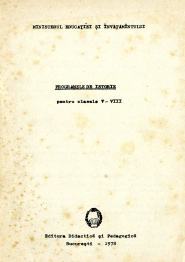
PROGRAMELE DE ISTORIE PENTRU CLASELE V-VIII
Editor: MINISTERUL EDUCAŢIEI ŞI INVAŢIMINTULUI Publisher: Editura Didactică şi Pedagogică Bucureşti - 1978 published as: Comandă fermă nr 26o IiP."Buletinul Oficial" Secţia XIX Cda. 14949/1978
More...We kindly inform you that, as long as the subject affiliation of our 300.000+ articles is in progress, you might get unsufficient or no results on your third level or second level search. In this case, please broaden your search criteria.

Editor: MINISTERUL EDUCAŢIEI ŞI INVAŢIMINTULUI Publisher: Editura Didactică şi Pedagogică Bucureşti - 1978 published as: Comandă fermă nr 26o IiP."Buletinul Oficial" Secţia XIX Cda. 14949/1978
More...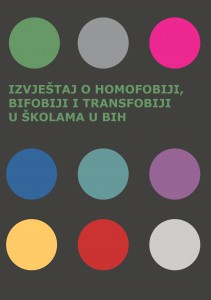
Cilj ovog izvještaja je da pokaže pravni okvir za ostvarivanje prava na obrazovanje LGBT osoba u srednjim školama u BiH, odgovarajuće obrazovne strategije, stepen uključenosti prava na obrazovanje LGBT osoba, način prikaza tema vezanih za LGBT osobe u udžbenicima koji se koriste u srednjim školama u BiH te istraživanja koja pokazuju stavove učenika_ica u pogledu homofobije, bifobije i transfobije. Zakon o ravnopravnosti spolova (2003) po prvi put izričito uvodi zabranu diskriminacije na osnovu seksualne orijentacije; indirektno na osnovu rodnog identiteta u pogledu ostvarivanja prava na obrazovanje LGBT osoba, te uvodi obavezu u pogledu prikaza tema vezanih za seksualnu orijentaciju i rodni identitet u nastavnim planovima i programima u smislu promovisanja principa jednakosti. Isti cilj postoji i u Zakonu o zabrani diskriminacije (2009), koji izričito navodi i rodni identitet kao zabranjeni osnov diskriminacije. Ove zakonske akte ne prate odgovarajuće strategije o obrazovnim politikama na državnom nivou koje se bave pitanjima prava na obrazovanje LGBT osoba, odnosno politike obrazovanja na entitetskom i kantonalnom nivou, te se homofobija, bifobija i transfobija uopšte ne spominju kao oblasti u kojima državna tijela i obrazovne institucije trebaju posebno djelovati kao bi se uklonila diskriminacija, netačne informacije i stereotipne slike. Da postoji diskrepancija na socijalnoj bazi pokazuje istraživanje o stavovima prema LGBT osobama koje je provedeno među učenicima_cama 2005. godine od strane Udruženja Q, te o načinu prikaza tema vezanih za LGBT osobe u udžbenicima koji se koriste u srednjim školama u BiH (2010). Na kraju, stavovi učenika_ca u srednjim školama pokazuju visok nivo spremnosti učenika_ca na verbalno i fizičko nasilje prema LGBT osobama (2012). Sve ovo ukazuje na potrebu da država i obrazovne institucije preduzmu odgovarajuće korake ka uklanjanju diskriminacije, te homofobije, bifobije i transfobije u srednjim školama u BiH kroz preduzimanje sljedećih koraka: - usvajanje izmjena i dopuna zakonskih akata koji regulišu oblast obrazovanja u BiH, kojima će seksualna orijentacija i rodni identitet eksplicitno postati zabranjeni osnovi diskriminacije u pogledu ostvarivanja prava na obrazovanje LGBT učenika_ica; - usvajanje i/ili izmjena obrazovnih strategija kojima će se odgovarajući organi obavezati na državnom, entitetskom, kantonalnom nivou, te nivou Brčko distrikta BiH, odnosno obrazovne institucije o uklanjanju netačnih informacija i stereotipa koji utječu na stvaranje i razvoj homofobije, bifobije i transfobije; - revidiranje nastavnih planova i programa u smislu uklanjanja netačnih i stereotipnih predodžbi o LGBT osobama, te otvaranje prostora za izučavanje tema vezanih za LGBT osobe, odnosno tema vezanih za drugačije seksualne orijentacije i rodne identitete. Ovaj prostor se prije svega može otvoriti unutar predmeta kao što su književnost, sociologija, psihologija, filozofija, demokratija i ljudska prava i sl; - revidiranje udžbenika koji sadrže netačne i stereotipne podatke o LGBT osobama, te razvijaju pogrešan stav kod učenika_ica o pitanjima koja su vezana za LGBT osobe; - uključivanje, kako u nastavu, tako i u sve vannastavne oblike tema vezanih za seksualnu orijentaciju i rodni identitet; - senzibiliziranje nastavnika_ca, pedagoga_inja, psihologa_inja i menadžment timova u srednjim školama o temama vezanim za LGBT osobe, te u tom smislu organiziranje do-edukacije kroz koju bi se izgradio LGBT senzitivan pristup; - rad na polju saradnje ministarstava obrazovanja, srednjih škola i pedagoških zavoda i nevladinih organizacija koje se bave LGBT pravima i slobodama; - uključivanje pitanja nasilja u srednjim školama nad LGBT osobama u programe rada ministarstava obrazovanja i unutrašnjih poslova, te usvajanje odgovarajućih izmjena u Krivičnom zakonu Federacije BiH, kojim bi se uveo zločin iz mržnje kao posebno krivično djelo ili kao otežavajuća okolnost pri izvršenju osnovnih oblika krivičnog djela ubistva, teških tjelesnih povreda, lakih tjelesnih povreda i sl; - primijeniti zakonske norme i standarde usvojene na državnom i nižim nivoima o razvoju demokratskog okruženja i poštivanja različitosti u srednjim školama.
More...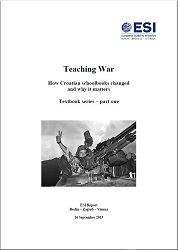
This report describes how the clash between different approaches to history education has played out in Croatian history textbooks. Until 2000, there was only one nationalist textbook in use, presenting a one-sided image of Croatia’s war history, both in the Second World War and in the conflicts that followed the dissolution of Yugoslavia. By 2013, when Croatia acceded to the EU, teachers could choose between four textbooks, which offered a much more nuanced picture. This reflected wider changes in how Croats viewed themselves, how they defined citizenship and how they saw their relationship with their neighbours and their Orthodox Serb minority.
More...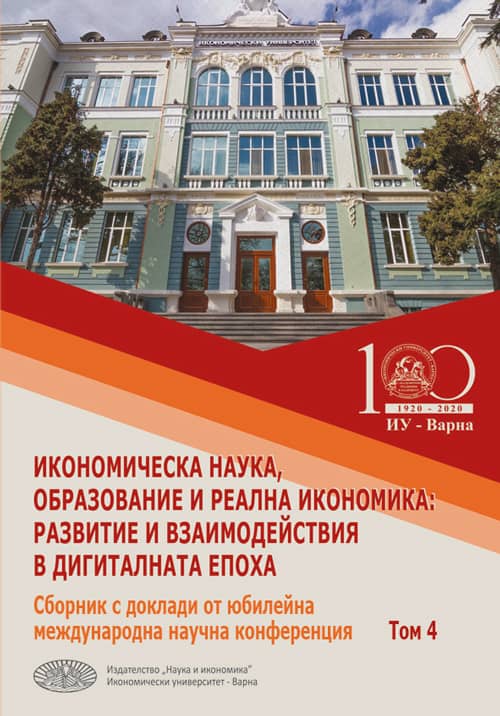
The Jubilee International Scientific Conference on the "Economic Science, Education and the Real Economy: Development and Interactions in the Digital Age", held on 11 – 12 May 2020, is dedicated to the 100th anniversary оf the University of Economics-Varna. Against the background of the cultural and economic rise from the end of the XIX and the beginning of the XX century, on May 14, 1920 the Chamber of Commerce and Industry of Varna decides to open a Higher School of Commerce in the city. This marks the beginning of higher economics education in the country. For the period of its existence the university has trained over 155,000 specialists with successful self-realization in the country and abroad. Today, more than 8,000 Bachelors, Masters and Doctorates from 52 countries study in 27 Bachelor's, 29 Master's and 16 Doctor‟s programs. One hundred years for a Bulgarian university is a remarkable anniversary. Some European universities have a much longer history, but when we give assessments, we must always consider the historical context. From this point of view and within the post-liberation period, 100 years of existence, for a Bulgarian university, is a remarkable achievement. The University of Economics – Varna is one of the oldest universities in Bulgaria and the university is rightly proud of its history. The Jubilee International Scientific Conference is focused on digitalization and all those profound transformations it causes in the economy and society. The theme of the conference has been chosen in the period preceding the outbreak of the global coronary virus pandemic. This is important to note because the current economic situation has changed dramatically. As a result of the state of emergency and the imposed social isolation, the economies all over the world have entered a recession. The business, our social and cultural lives have come to a standstill. The economic crisis that has begun is unprecedented both in its cause and most likely in its scale and scope, and it is currently confronting us with specific economic problems. But we believe in science and medicine, in the human mind and intelligence, and we have no doubt that the epidemic will be brought under control and sooner or later the world will return to normal. Then the fundamental determinants of economic activity shall start to operate, one of which is the ongoing process of digitalization. The present economic situation has confronted us with specific economic problems, but it has also shown in a clear and unequivocal way how important new technologies are in modern life, in particular in the conditions of emergency and social distance. It is in these conditions that all our communication, the opportunity for public institutions to continue with their work, online university and school education, etc. rest on digital technologies today. This conference has also been made possible by modern technology. The crisis, from a certain point of view, has given a new impetus to the digitalization of society. In the context of current events and the explanations given above, the topic of the conference is focused on the long-term development of the economy and society as a whole. The scientific event aroused considerable interest. The conference was attended by 340 scientists, researchers, lecturers, PhD students and students from 23 Bulgarian and 15 foreign universities and research organizations from Germany, Lebanon, Lithuania, Poland, Portugal, Romania, Russia, Slovakia, Serbia, Croatia and Ukraine, as well as representatives of business and various institutions. Plenary reports of the conference have been presented by: Prof. Evgeni Stanimirov PhD - Rector of the University of Economics – Varna, "Quo vadis, education?", Prof. Daniela Bobeva PhD, Institute for Economic Research at BAS, "Costs and Benfits of Euro Adoption in Bulgaria: lessons Learned from the Long Path of Bulgaria to the Euro' Mr. Plamen Rusev PhD, one of the successful alumni of the University of Economics-Varna, Executive Chairman of the Webit Foundation and a member of the Board of Directors of Endeavor Bulgaria, addressed the plenary session with a speech on "Bulgaria – a platform for creating global initiatives." The proceedings covers 263 reports, in 4 volumes. The range of problems in the reports is wide, in line with the idea of the scientific forum: to analyze the manifestation of digitalization not only in business and economy, but its social, institutional and legal aspects, as well. A very important part of the conference is the reports that examine the impact of digitalization on education and science.
More...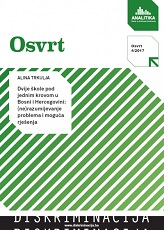
The focus of the work are the so-called "Two schools under one roof", currently 34 such in two cantons of the Federation of Bosnia and Herzegovina (hereinafter FBiH), Herzegovina-Neretva (HNK) and Central Bosnia (SBK), according to which students attend classes in two schools within one school building, separated by ethno-national affiliation, often with a ban on "mixing". Here, segregation and even discrimination in schools are more clearly seen, but in areas of BiH with a dominant ethnic majority, although it should be noted that the latter are not immune to them either. Because, as simplistic as it may sound, Bosnia and Herzegovina essentially has three types of schools3 and three school systems or “three schools under one roof”. // The aim of this analysis is to map current practices in education in BiH from the perspective of language and identity, as well as to identify dominant concepts and models for solving the problem of divided education operated in political and expert platforms and initiatives in this area, and critically evaluate them. in accordance with the principles, values and goals of education established by the international human rights framework and the state legal framework. About this practice, with emphasis on the attitudes of teachers, parents and students, several major studies have been done so far, the conclusions of which are the starting point and basis for the analysis of proposed models of education.5 Relevant international standards and laws were used as primary sources. and strategic documents in BiH. From secondary sources, books, academic and media articles and reports, as well as media appearances of relevant actors and experts in the field of education were consulted. Through interviews with experts and decision-makers at various levels, primarily representatives of the OSCE and relevant ministries of education, but also through a number of sources on shared education, the currently dominant model proposals for overcoming identified problems and achieving fairer, inclusive and intercultural education were identified and analyzed.
More...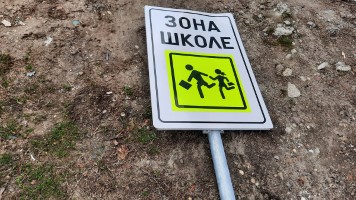
Deca se u ponedeljak vraćaju u učionice. Tim za škole doneo je odluku da raspust neće biti produžen. Učenici od prvog do četvrtog razreda nastavu će pohađati neposredno, dok će viši osnovci i srednjoškolci raditi po kombinovanom modelu. Đaci i nastavnici upozoreni su da moraju dosledno primenjivati „mere lične zaštite od infekcije kako u školi, tako i van škole“.
More...
Ona učiteljica Smilja je nas u školi ispitivala matušu. Uča je rekla: „Al biće to malo teži zadaci, za bolju ocjenu! Zato je najbolje da sami se javite ko oće imat četvu ili peju!“ Tu smo mi svi rulja spustili glave i zapiljili smo se u parketić. Samo je ona štreberica Nela Svinjogojstvo dignila ruku. Uča Smilja je rekla: „Opet ti, Nela? Pa ti već imaš peju iz matuše! Nemoš dobit veću ocjenu!“ Nela Svinjogojstvo je rekla: „Zar nije veća ocjena od peje kad imaš dvi peje?“ Uča je zakolutačila sa očima i rekla je: „Okej, aj izađi na ploču…“
More...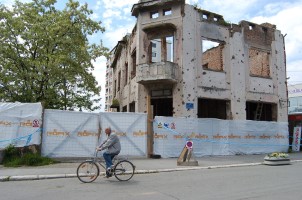
Učiteljica Smilja je u školi rekla da ponavljaćemo gradivo iz poznavanja prirode i društva. Uča je rekla: „Saćemo sa par pitanja i odgovora utvrdit ono šta smo naučili juče!“ Mi rulja u razredu smo klimnili sa glavušama. Onda je učiteljica Smilja pitala: „Ako su zbog pandemije koronavirusa zabranjena sva okupljanja, ako na pirevima i sprovodima ne smi bit više od po tries ljudi, a na komenoraciji u Vukovaru se smi okupit pesto ljudi, s tin da ih se očekuje i masu više, šta to ustvari znači? Aj ti Nela!“
More...
Učiteljica Smilja je sa maskom priko face stojala kod svoje klupe. Ona je koljački gledala nas rulju u razredu. Na učinoj klupi su bile ispravljene zadaće iz hrvackog. Učiteljica Smilja je rekla: „To šta san ja u ovin zadaćama čitala, to je majkemi za bogu plakat! To pas s maslom ne bi izija!“ Mi smo svi šutili i sidili smo popišmanjeno. Onda je uča rekla: „Dok san ovo doma ispravljala, časna rič san svako malo išla u banju izrigat se! A kad bi se izrigala, onda bi se pitala – gospe moja, zašto su od sve dice na svitu najveći debili upali u moj razred? Šta san ja bogu zgrišila da me tako kaznija?“
More...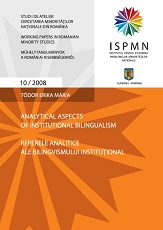
The present study deals with institutional bilingualism in the context of school structures in Romania where the language of teaching is different from Romanian. The conclusions of the paper show a few possible directions to follow in the context of conceiving an educational policy in which the linguistic alterity represents a natural element to be taken into consideration when considering the qualitative aspects of organisational structures.
More...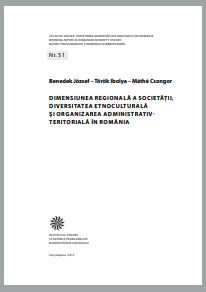
The present study asks in its title, which attempts to outline the current situation of the Hungarian folk dance teaching in Romania and to assess the practice and opportunities created by the natural (or in some places propagated) demand. In fact, it is actually trying to map a "curriculum" that is formally non-existent in the Romanian educational system, which is based on the needs of the invited or self-proclaimed dance instructors and co-leaders, but the study also seeks the basic question of whether it is possible and if so, then what methods to teach segments of traditional folk culture, namely, whether it is possible to instruct the "folk dance" in an artificial environment instinctively?
More...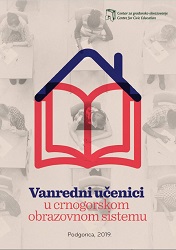
Centar za građansko obrazovanje (CGO) je, na tragu inicijativa građana i građanki, istraživao podatke o broju i načinu polaganja vanrednih učenika u Crnoj Gori. Fokus je bio na utvrđivanju broja vanrednih učenika u srednjim školama u Crnoj Gori u odnosu na broj redovnih, kao i iznos prihoda koje škole ostvaruju po ovom osnovu i kako se ti prihodi raspodjeljuju. Srednje obrazovanje u Crnoj Gori pružaju gimnazije, srednje stručne škole, obrazovni centri i umjetničke škole odnosno 48 državnih ustanova, jedna privatna i jedna državno-privatna. Pri tom, stručno obrazovanje se stiče na više nivoa: nižem (2 godine), srednjem (3 ili 4 godine) i višem stručnom (V stepen), dok obrazovanje u gimnaziji traje četiri godine, a u skladu sa obrazovnim programom. Učenici mogu imati status redovnih ili vanrednih, pri čemu ovi drugi treba da budu izuzetak a prvi pravilo.
More...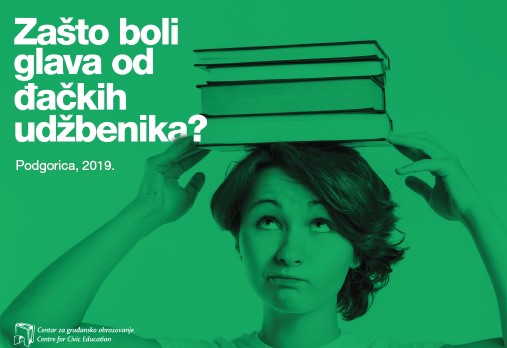
Zavod za udžbenike i nastavna sredstva (ZUNS) svake godine izdaje djelimično izmijenjene i dopunjene ili potpuno nove udžbenike za osnovnu i srednju školu. Te promjene udžbenika stvaraju i dodatni trošak u budžetu Crne Gore i roditelja, a autorima, recezentima, štamparijama i distributerima korist. Zavod za statistiku Monstat nema javno objavljene podatke o broju učenika za školsku 2017/2018 i 2018/2019. godinu. Posljednji objavljeni zvanični podaci prikazani su za školsku 2016/2017 kada je osnovnu školu pohađalo 67 516 učenika, srednju 27 565 učenika, a visoko obrazovanje 23 138 studenata. Po podacima Ministarstva prosvjete, iznijetim u medijima, u Crnoj Gori je u školskoj 2018/2019 ukupno 28 700 učenika pohađalo srednje obrazovanje, dok je osnovno obrazovanje pohađalo njih oko 68 000. Ministarstvo prosvjete utvrđuje neophodne udžbenike i nastavna sredstva i vrši izmjene i dopune istih za osnovnu i srednju školu, shodno utvrđenom planu i programu Zavoda za školstvo, a na prijedlog Nacionalnog savjeta za obrazovanje što odobrava i sam Savjet svojom Odlukom. Nacionalni savjet za obrazovanje je u obavezi da odobri listu udžbenika. Odbor za opšte obrazovanje i Odbor za stručno obrazovanje daju saglasnost na utvrđenu listu udžbenika prije nego to odobri i sam Nacionalni savjet za obrazovanje. U skladu sa poslovnikom o radu Nacionalnog savjeta za obrazovanje, odluka se donosi ako se za nju izjasni više od polovine ukupnog broja članova Nacionalnog savjeta.
More...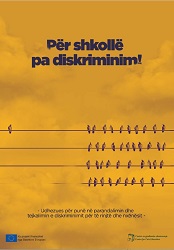
Udhezuesi për punë në parandalimin dhe tejkalimin e diskriminimit për të rinjët dhe nxënësit “Për shkollë pa diskriminim!” u krijua në kuadër të projektit 360° Rrethi i plotë për të drejtat e njeriut, të cilin me përkrajen e Bashkimit Evropian e realizon Qendra për Edukim Qytetarë (QEQ), në partneritet me OJQ-në Kompanija Alternative Teatrale (ATAK) nga Podgorica, Shtëpinë për të Drejtat e Njeriut nga Zagrebi dhe Festivalin Ndërkombëtar të filmave dokumentar (BELDOCS) nga Beogradi, e në bashkëpunim me Ministrinë e Arsimit dhe Institucionin Mbrojtësin e të Drejtave të Njeriut dhe Lirive Mali i Zi. Një nga qellimet specifike të projektit është promovimi i konceptit të arsimit pa diskriminim në sistemin formal edukativo-arsimor dhe zhvillimin e antidiskriminimit dhe kulturës të drejtave të njeriut ndërmjet të rinjëve. Për këtë, ky udhezues u dedikohet të rinjëve dhe nxënsave që t‘ju ndihmojë në njohjen, parandalimin dhe procesimin e rastëve të diskriminimit, shkeljeve të tjera të drejtave të njeriut, dhunës mbrenda institucioneve arsimore dhe para institucionëve jashtë sistemit arsimorë. Në udhezues janë të sqaruara hollësisht konceptet e diskrimininit dhe manifestimet e ndryshme të tij, rolet dhe pergjegjësitë e pjesmarrësve në procesin edukativo-arsimor, dhe është dhënë një pasqyrë e shkurtër e kuadrit institucional i cili mbron nga diskriminimi dhe shkelja e të drejtave të njeriut, me pershkrimin e procedures të përpunimit të rastëve mbrenda dhe jashtë sistemit shkollorë. Qellimi përfundimtarë i udhezuesit “Për shkollë pa diskriminim!” është që si mjet ndihmës t’ju ofrojë të rinjëve përkrahje që të marrin pjesë në mënyrë aktive në mbrojtjen e të drejtave të veta, parandalimin e diskriminimit dhe shkeljen e të drejtave të tjerve, si dhe në avokimin dhe promovimin e kultures së drejtave të njeriut në mjedisin shkollorë dhe lokal.
More...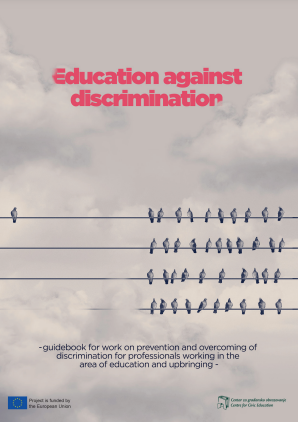
Guidebook for work on prevention and overcoming of discrimination for professionals working in the area of education and upbringing was created within the project 360° Full Circle for Human Rights!, which with the support of the European Union is implemented by the Centre for Civic Education (CCE) in partnership with NGO Alternative Theatre Company (ATAK) from Podgorica, Human Rights House from Zagreb and International Documentary Film Festival (BELDOCS) from Belgrade, in cooperation with Ministry of Education and Institution of Protector of Human Rights and Freedoms from Montenegro. One of the specific objectives of the project is promotion of concept of education without discrimination in formal educational-upbringing system and development of anti-discrimination and the culture of human rights amongst the youth. Thus, this guidebook is intended for professionals working with youth in education (teachers, professional services, heads of schools, councils of parents, expert bodies and actives) with an aim to aid them in recognizing, prevention and processing of discrimination cases, other violations of human rights and violence within schooling institutions and before institutions outside of educational system. The guidebook contains terms of discrimination and its various manifestations clarified in detail, the role and responsibility of participants of upbringing-educational process, and the overview of legislative and institutional framework is also given which protects citizens from discrimination and violation of human rights, with the procedure of processing the cases, as well as the overview of the most important international documents and standards in this area. The ultimate goal of the guidebook is to, as an auxiliary mean in the work with youth, even in teaching, contribute to development, encourage and nurture antidiscrimination culture via education.
More...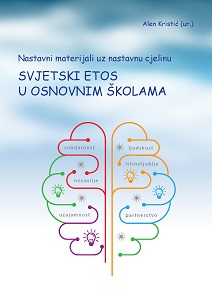
Na ovom se mjestu nalaze nastavni materijali potrebni za realizaciju nastavne cjeline "Svjetski etos u osnovnim školama" iz "Priručnika svjetskog etosa za osnovne škole". Nastavni materijali - priče, molitve, debatske kartice, kvizovi, deklaracije... - poredani su tako da prate strukturu dotične nastavne cjeline odnosno strukturu nastavnih jedinica od kojih se ona sastoji. Podsjećamo da se nastavna cjelina "Svjetski etos u osnovnim školama" sastoji od osam nastavnih jedinica: 1. Ljudskost: temeljni poziv svakog čovjeka 2. Uzajamnost: „zlatno pravilo“ u sferi ljudskoga 3. Kultura nenasilja i strahopoštovanja pred svekolikim životom 3.1. Mirotvorstvo – Nenasilje – Pomirenje 3.2. Ekologija: susretište vjerničke i građanske odgovornosti 3.3. Vršnjačko nasilje 4. Kultura solidarnosti i pravednog ekonomskog poretka 5. Kultura tolerancije i života u istinoljubivosti 6. Kultura ravnopravnosti i partnerstva muškarca i žene 7. Svjetski etos kao platforma izrade razrednog i školskog etosa 8. Dijalog religija: nužan prilog svjetskom miru i blagostanju - a svaka nastavna jedinica od: A. Teorijske pozadine B. Motivacije C. Scenarija. U svrhu lakšeg snalaženja rubovi stranica s nastavnim materijalima označeni su baš onim bojama kojim su označeni rubovi stranica odgovarajućih nastavnih jedinica u "Priručniku svjetskog etosa za osnovne škole". Dakako, prezentirani nastavni materijali nisu obvezujuće prirode. Nastavnicima je ostavljena puna sloboda koristiti se ne samo drugim tekstovima nego i drugim metodama za podučavanje učenika. S obzirom na književno, religiozno, glazbeno, dakle općenito kulturno bogatstvo naše zemlje, pa i regije, to ne bi smjelo predstavljati nikakav problem.
More...
The current study aims to identify the educational needs of the Koni Municipality population. For this purpose, qualitative research, namely focus group discussions were conducted in the region. Total of 6 focus groups were conducted in the town of Koni and village of Nakhakhulevi. Respondents were divided into focus groups according to their age and place of residence, rural or urban settlements within Khoni municipality. The research showed that poverty and unemployment are one of the most pressing economic issues in the municipality. Majority of the currently employed individuals in the municipality work in agricultural, retail trade and furniture production sectors. Due to lack of educational centers in the municipality and limited financial resources, the majority of the local population does not have access to post-secondary formal or informal education. Namely, among most demanded skills and knowledge were foreign language proficiency, computer literacy and craftsmanship. Thus, these are the spheres the population would be willing to have training courses locally.
More...
The present research conducted by the Center for Social Sciences (CSS) touches upon the ties between education and employment in Georgia and covers three main dimensions: individual return of education (financial benefits), compatibility of education with the labour market, and job satisfaction. Data analysis presented in this paper is based on the nationwide representative quantitative survey carried out by CSS in summer 2016 as a part International Social Survey Program (2015 Work Orientation IV Survey); we also used the World Bank 2013 statistical database. The data was analysed using the SPSS statistical program. The publication consists of three interconnected chapters. The structure consecutively follows the abovementioned topics that are actively studied by the economics of education in the contemporary world. Since our main objective was to show the real picture of the relations between education and employment in Georgia, we believe that the research findings will largely contribute to the better understanding and development of the state education policy. Each chapter consists of three parts: context, i.e. literature review; overview of the main findings, i.e. in-depth analysis of the obtained data; and summary discussion containing all the major conclusions and findings of the research. At the end of the publication, certain recommendations are provided for the state agencies and educational institutions. The publication ends with annexes containing tables and diagrams and the respective bibliography.
More...
The rapid change of education system reform vector in Georgia increased the General Education centralization process. During the last two years the changes were passed in the law on General education. The changes reinforced the role of Ministry of Education and Science was in the school management process. The Minister issued decrees, Teachers Professional Code of Ethics, Students Code of Ethics, Standard of School Principle were adopted and enforced in 2010. Based on the new regulations Georgian Public Schools developed and renewed Public School Bylaws. // The School Bylaws reflected the changes entered in force. The General Education system management changed and as a whole it contributed strengthening the zero tolerance tendencies. The school discipline management procedures are strengthened. The School Bylaws determined the inflexible punishable measures connected with the discipline abolishment, though the exact description of the discipline abolishment in the prepared Bylaws is not noticed. The Bylaws define the school management style and control mechanisms. In this article the Georgian Public Schools’ Bylaws are studied and identified the needs of systematic changes of Education Policy, in particular, discipline management.
More...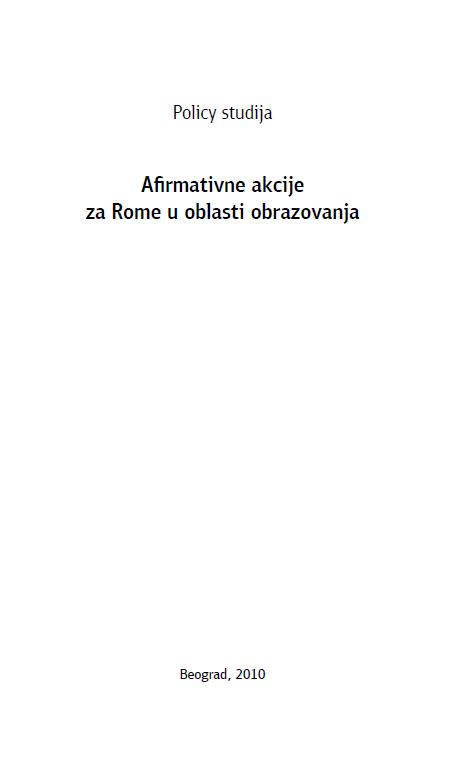
Before you is a study of a practical policy - the policy of affirmative action for Roma in the field of education in Serbia. The Institute of Affirmative Measures is a relative novelty in our legal system. However, bearing in mind that, in various forms, affirmative measures have been implemented for seven years (2003-2009), it is extremely important to review the existing policy from the point of view of its effects on improving the educational position of the Roma and increasing the degree of inclusivity and cohesion of society as a whole. The introduction of the institution of affirmative actions into the legal system means that society recognizes the gap that exists between the protection of certain rights and the availability of those rights to marginalized and vulnerable groups, and represents efforts to ensure equal opportunities for all citizens. Consequently, improving the position of Roma increases the degree of stability and cohesion of society, which is a prerequisite for balanced development and well-being of all citizens of Serbia. The obligation of states to implement measures to ensure the realization of rights is woven into a series of international declarations and conventions of the United Nations and the Council of Europe, to which Serbia is also a signatory, and is also an integral part of the Europeanization process of Serbia, as improving the position of the Roma is one of the obligations from the European Partnership. In this study, starting from the purpose of affirmative actions - improving the position of the Roma population and increasing the level of inclusivity and cohesion of society - existing policies, legislative framework and institutions are analyzed, and the implementation and effects of existing measures are evaluated. The analysis is followed by concrete recommendations for the improvement of existing affirmative action measures in Serbia.
More...